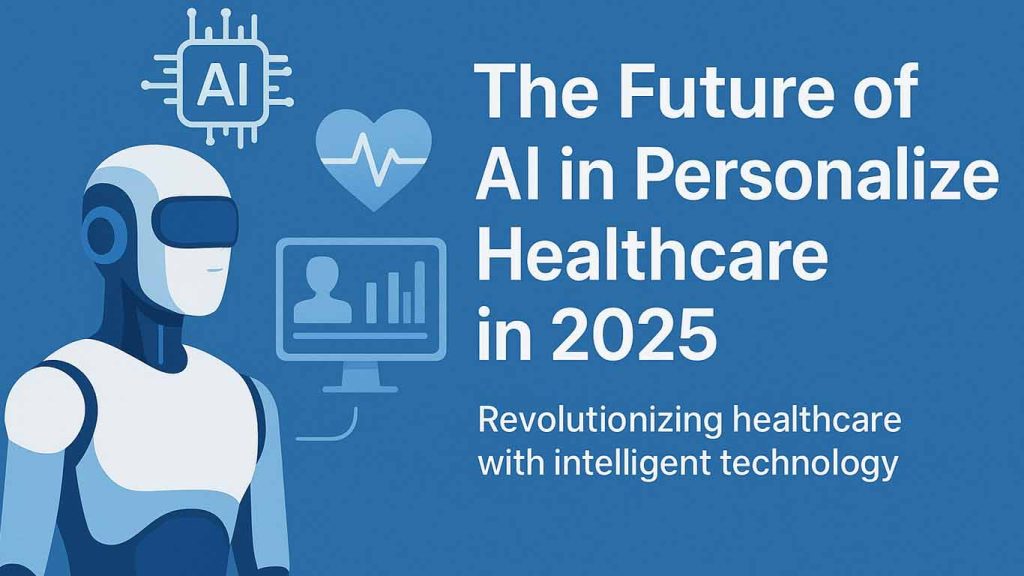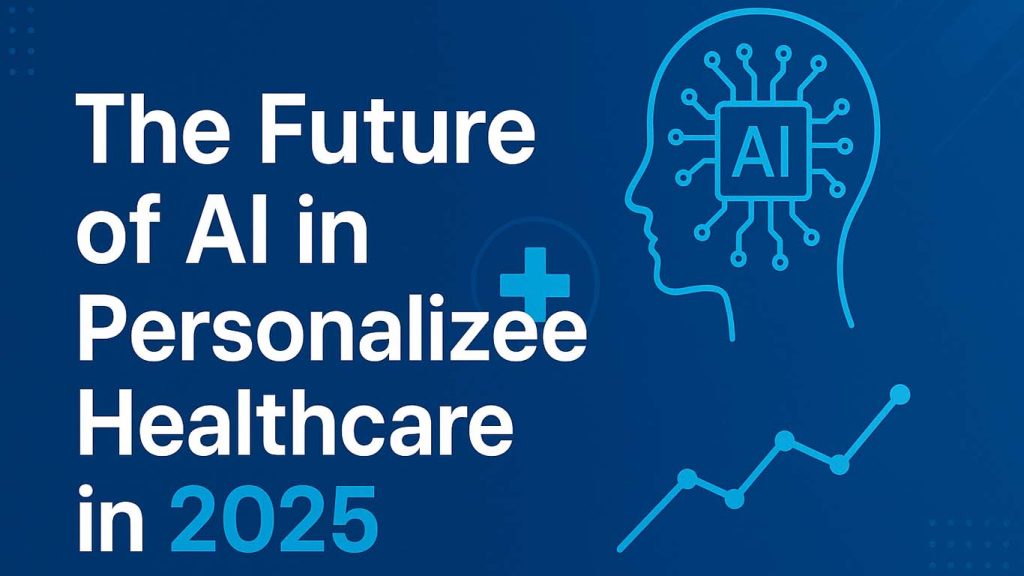
The Future of AI in Personalized Healthcare in 2025
Introduction
Artificial Intelligence (AI) has rapidly evolved from a futuristic concept into a fundamental tool reshaping industries, and healthcare is at the forefront of this transformation. In 2025, the convergence of AI and personalized healthcare represents one of the most significant revolutions in modern medicine. No longer limited to generic treatments, Personalized healthcare systems are leveraging AI-driven insights to tailor medical care to individual patients’ genetics, lifestyles, and real-time health data.
The global demand for AI in healthcare has grown exponentially. According to market research, the AI Personalized healthcare market is projected to surpass $188 billion by 2030, with personalized medicine serving as a core driver. In an era where efficiency, precision, and patient-centered approaches are paramount, AI has emerged as the linchpin of 2025 healthcare trends.
This blog explores the current state of personalized Personalized healthcare, the projected advancements by 2025, challenges, ethical dilemmas, and future implications. By the end, you will gain a clear understanding of how the future of AI is transforming the way we prevent, diagnose, and treat diseases.
Understanding Personalized Healthcare
What is Personalized Healthcare?
Personalized healthcare (also known as precision medicine) is a medical approach that customizes treatments and healthcare strategies to individual patients rather than adopting a one-size-fits-all model. It considers genetic data, lifestyle, environmental factors, and medical history to provide tailored care.
The Role of AI in Personalized Healthcare
AI amplifies this model by analyzing massive datasets quickly and accurately, identifying hidden patterns, and predicting treatment outcomes. Machine learning (ML), deep learning, and natural language processing (NLP) are critical AI technologies enabling smarter, faster, and more individualized care.
Example: IBM Watson for Oncology has demonstrated the ability to recommend cancer treatments based on individual patient records and research data, offering doctors evidence-based recommendations within seconds.
The Current State of AI in Personalized Healthcare (2023–2024)
1. AI in Diagnostics
AI-powered tools such as Google’s DeepMind have achieved remarkable accuracy in detecting diseases like breast cancer, outperforming human radiologists in some studies.
2. Genomic Medicine
Platforms like Illumina leverage AI to decode genomes quickly and affordably, enabling doctors to design treatments that target genetic variations.
3. Predictive Analytics
Hospitals currently use AI to predict patient readmissions, detect sepsis early, and forecast disease progression, reducing healthcare costs and improving patient outcomes.
4. Remote Patient Monitoring
Wearables like Fitbit and Apple Watch, combined with AI, track heart rate, sleep, and blood oxygen levels. Healthcare providers then use AI-driven dashboards to monitor patients in real-time.
Case Study: Mount Sinai Hospital in New York utilizes AI algorithms to detect early signs of heart failure from electronic health records (EHR), allowing for proactive interventions.
The Future of AI in Personalized Healthcare in 2025
As we move into 2025, AI’s capabilities in healthcare are becoming more sophisticated and integrated. Below are the major advancements shaping the future of AI in medicine:
1. Hyper-Personalized Treatment Plans
By 2025, AI systems will integrate genomic sequencing, biomarker data, and lifestyle analytics to generate treatment plans unique to each patient. This will significantly improve outcomes in oncology, neurology, and chronic disease management.
Example: Cancer patients will receive drug combinations based on their tumor’s genetic mutations, reducing trial-and-error approaches.
2. AI-Enhanced Real-Time Monitoring
AI-powered wearables and implantable sensors will monitor vital signs continuously and send alerts to Personalized healthcare professionals. This allows interventions before conditions escalate.
Use Case: AI-driven glucose monitors will automatically adjust insulin dosages for diabetic patients through closed-loop systems.
3. Virtual AI Health Assistants
Chatbots and virtual assistants will handle routine tasks such as scheduling, answering medical queries, and reminding patients about medications. These assistants will also analyze health data to offer preventive care tips.
4. AI in Preventive Medicine
AI will predict the likelihood of developing diseases like diabetes or cardiovascular conditions based on real-time biomarkers and genetic predispositions. Preventive care plans will be automated and personalized.
Statistic: A 2024 Deloitte report predicts that AI preventive tools could reduce Personalized healthcare costs by 15–20% globally by 2025.
5. AI and Robotics in Surgery
By 2025, robotic surgeries guided by AI algorithms will minimize human error, increase precision, and shorten recovery times. Robots will be able to adapt during surgery using real-time imaging data.
6. Mental Health and AI
AI-powered platforms like Woebot and Wysa already provide cognitive behavioral therapy (CBT). In 2025, these will evolve into more empathetic, context-aware systems to support mental health at scale.

Benefits of AI in Personalized Healthcare
- Increased Accuracy: AI reduces human error in diagnosis and treatment planning.
- Cost Efficiency: Preventive analytics lower long-term Personalized healthcare costs.
- Accessibility: Virtual assistants and telemedicine expand care to underserved regions.
- Faster Drug Discovery: AI accelerates drug trials by simulating molecular interactions.
- Improved Patient Engagement: Personalized recommendations keep patients active in their care journey.
Challenges and Ethical Considerations
1. Data Privacy and Security
Personalized healthcare requires access to sensitive data, raising concerns about HIPAA compliance, cybersecurity, and unauthorized data usage.
Solution: Blockchain and federated learning are emerging as secure solutions for handling sensitive health data.
2. Algorithmic Bias
AI models trained on biased datasets can lead to inaccurate diagnoses or unequal treatment across different demographics.
Example: Studies show that some AI dermatology apps perform less accurately on darker skin tones.
Solution: Implementing diverse datasets and transparent auditing of AI models.
3. Regulatory Challenges
Global Personalized healthcare regulators struggle to keep pace with AI innovation. Clear guidelines are essential for AI adoption in hospitals and clinics.
4. Human-AI Collaboration
While AI can analyze data, doctors must balance AI recommendations with clinical judgment to ensure holistic patient care.
Expert Opinions
- Dr. Eric Topol, author of Deep Medicine, emphasizes that “AI won’t replace doctors, but doctors who use AI will replace those who don’t.”
- WHO (World Health Organization) predicts that by 2025, AI will be central to achieving universal Personalized healthcare coverage.
Case Studies
- Mayo Clinic & AI Diagnostics
Mayo Clinic integrated AI into its cardiology department, reducing diagnostic errors for heart disease by 30%. - Roche & Genomic AI
Roche partnered with AI startups to design cancer treatments tailored to patients’ genetic makeup, reducing drug trial timelines by half.
Visualizing the Future
(Here you would include infographics comparing AI adoption in 2023 vs. 2025, a chart of top AI Personalized healthcare tools, and flow diagrams showing AI-assisted personalized care pathways.)
Recommendations for Patients and Personalized healthcare Providers
- Patients: Embrace AI-powered wearables and telehealth apps to stay proactive about health.
- Doctors: Use AI for diagnostics and decision support, but prioritize human empathy in patient care.
- Hospitals: Invest in AI infrastructure, secure patient data, and train staff to adapt.
Conclusion
The future of AI in personalized healthcare in 2025 promises a paradigm shift in how we understand, diagnose, and treat medical conditions. AI’s role will extend beyond efficiency—it will reshape patient experiences, empower preventive care, and democratize access to advanced treatments.
However, ethical challenges such as privacy concerns, algorithmic bias, and regulatory hurdles cannot be overlooked. Addressing these responsibly will determine whether AI serves as a transformative ally or a disruptive risk in Personalized healthcare.
In the end, AI in Personalized healthcare is not about replacing doctors but enhancing their ability to provide compassionate, individualized, and data-driven care. For patients, it means Personalized healthcare that is no longer reactive but preventive, proactive, and deeply personal.
